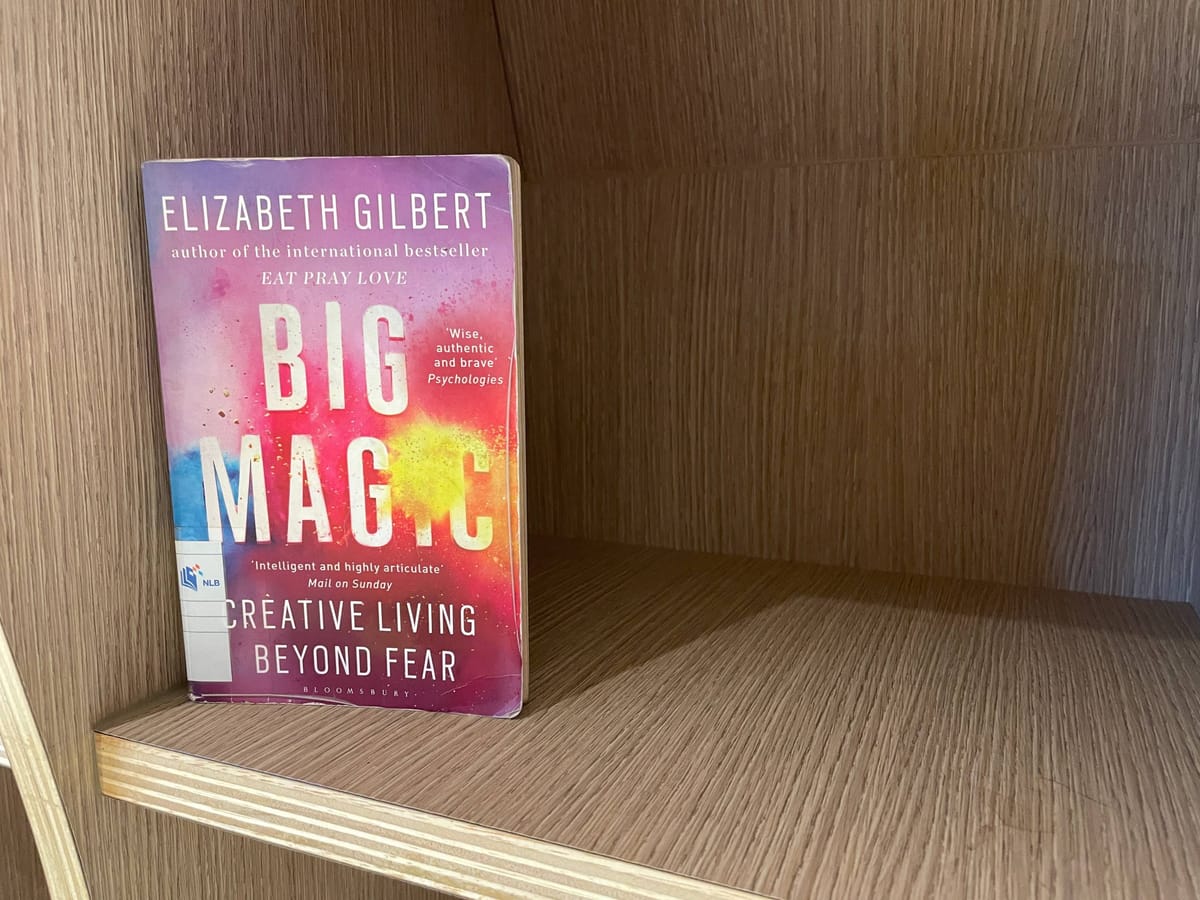Elizabeth Gilbert's Big Magic

Working a customer-facing job like a barista can lead to interactions with people whom otherwise wouldn't cross paths with you. One of the regulars I served was reading Big Magic by Elizabeth Gilbert and I was intrigued. He had the book and a notebook on the table so I assumed he was going to take... notes. I asked him what he thought of the book so far.
"Do you write?" He asked.
I gulped. Was I about to admit to a stranger that I'm a struggling artist who writes irregularly on her blog and sporadically works on her novel(s)? Does the whole being-a-barista thing adds to the charm of the stereotype?
"Yeah, I do," I responded, aware that I've been away from behind the bar for too long.
"Well you should read it. It's got some good points about writing. And in general."
I smiled and promised to give him an update once I've finished reading it. When I had the time, I looked for the book on the NLB app and reserved it. A librarian gave me a call because the book was so old, it had tiny splotches all over - although it was still in readable condition. It was finally available a week after the reservation.
I haven't seen the customer since.
In case you're wondering why she sounds so familiar, Elizabeth Gilbert is also the author of Eat, Pray, Love. When I was in my late-teens/early-20s, I found the book rather inspirational. I picked it up again in my mid-20s and was appalled by how whiny it was. And it's a memoir! But you know what? It doesn't matter if I found it whiny. Elizabeth Gilbert was played by Julia Roberts in the movie version. She made bank, I did not. Good for her.
So I was expecting Big Magic to have a similar tone, but was pleasantly surprised that it was quite the opposite. It was pretty upbeat, more positive, and dare I say... funny. But at times it was a little woo-woo. I mean, it's a literal book called Big Magic, and she had a whole ass book about going into spirituality in India and Indonesia (cough, obviously, Bali).
Do I recommend the book? Yes and no. Yes, for the fun of it. She's quite a fantastic storyteller. No, because at times it rubbed me the wrong way; feels like she's not aware of her White American Woman privileges most of the time.
I would be rather impressed with the book if I hadn't read The Artist's Way by Julia Cameron. They are similar in the way they speak about creativity as some sort of divine gift to humanity (Cameron's approach was more Christian-based, while Gilbert's just generally... spiritual). Or, that our creations are inside us - a painting, a sculpture, a story - and we have to "release" them.
I know, kinda... woo-woo.
What struck me about this book is how good of a storyteller Gilbert is. I complained a bit when starting the book but she managed to keep me going. Okay, granted, she is a writer with an international bestseller that went on to become a successful movie. It'll be weird if she was a shitty storyteller...
I've also noticed that in books written by published authors about writing or creativity in general, the common thread is to just do the work and not think about success or future of your work. I mean, I guess it's good advice? Sometimes we're too caught up in our own heads (guilty) that we don't even explore a creative pursuit. Self-sabotage is real. Just quit complaining and do it.
The book is divided into 6 chapters - courage, enchantment, permission, persistence, trust and divinity - that are broken down into more sub-sections. It's... a lot.
I'm not going to give a sparknotes of the book but here are some notable bits:
- Gilbert didn't go to school to be a writer. In fact, she advises against attending higher education in writing for fear of going into unnecessary debts for such a cutthroat industry. She used to wait tables with 2 notebooks in her back pocket: one for writing orders, and the other for writing her observation of people. Yeah be nice to service staff, unless you want to be material for their next book/short story/comedy set.
- Ideas visit people randomly and when that idea leaves you (because you rejected it), it will visit someone else to bring it to life. This is why sometimes I read or watch something and think, hey... I thought of that story line. Well, someone actualised it. You're welcome.
- Creative pursuits shouldn't bring you anguish. I've talked about this in Sadness as a Canvas. It shouldn't make you worry. If you're not making money from your creative pursuits, then take on a day job to make money, and pursue your creative endeavours on the side. Screw the starving artist in anguish trope. We can't all be Van Gogh.
- Some writers stop creating when they fear they cannot beat their greatest books like Harper Lee, who wrote To Kill a Mockingbird. Their success became their undoing (Harper Lee did get the sequel of TKAM called Go Set a Watchman which I haven't read).
I usually don't read reviews of books before I read them because I know books are interpreted by people differently depending on where they are in their life, and all their experiences up to that point. So take this "review" with a pinch of salt.